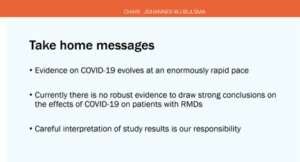
Rheumatology at the centre of the COVID-19 pandemic
Unsurprisingly, the COVID-19 pandemic was the elephant in the room throughout this e-Congress. Delegates sat behind their screens to view lectures and asked questions using a chatbox function. Only minor technical issues occurred, honestly to be expected in this new era of conference attendance. And while 17,500 attendees connected on Day 1 of the e-Congress, the typical media channels, e.g. Twitter, appeared significantly quieter than 2019’s edition. Indeed, Editorial Board Members at BMC Rheumatology remarked to me that clinical and household duties interfered with their ability to engage fully in this meeting. Good thing that all lectures and conference resources are online until 1 September 2020!

COVID-19 has become part of our medical reality, and the scientific programme demonstrated this. Prof Robert Landewé, University of Amsterdam, led an opening session on EULAR recommendations related to the management of RMDs in the context of COVID-19. He noted that rheumatologists are well-placed to manage coronaviruses, given that i) they understand the immune system, ii) their medical speciality is used to treating multiple organ systems at once, and iii) rheumatologists often use the immunotherapy drugs currently being trialled in SARS-CoV-2.
Dr Machado provided reassurance that rheumatic patients receiving immunosuppressant medications were not disproportionately affected by SARS-CoV-2
Notable talks included Dr Pedro Machado, University College London, who reported the first findings from the Global Rheumatology Alliance database on the outcome of COVID-19 and impact of rheumatic disease therapy on 600 patients across 40 countries. He provided reassurance that rheumatic patients receiving immunosuppressant medications were not disproportionately affected by SARS-CoV-2. Researchers analysed rheumatic patient data and studied potential hospitalization and course of COVID-19 infection, valuable data given its scarcity to date. The intake of glucocorticoid steroids, of anti-malarial drugs (e.g. hydroxychloroquinine), and of TNA-alpha inhibitors were associated with an increased, no change, and reduced probability of hospitalizations, respectively. Most patients with RMDs recovered from COVID-19 irrespective of their medication choice, and treatment regimens should proceed with vigilance. As this study was associative and not causative, well-designed clinical trials are needed to inform future medical practice.
Prof John Isaacs, University of Newcastle, then talked about the increased risk of rheumatic patients suffering from venous thromboembolism, a blood clotting complication that can kill one third of those affected. Since these blood clots play a serious role in how COVID-19 kills, new research indicates that TNF-alpha inhibiting drugs reduce thrombotic risk by lowering inflammation. Increased awareness of such complications and maintenance of therapies is therefore recommended in people with arthritis.
Even before COVID-19, Dr Kristen Hoeper explained that ~50% of patients with RMDs received inadequate medical care. One new study from Germany demonstrated that patient care in rheumatoid arthritis by ‘rheumatological assistants’ (i.e. specialized nurses) is just as effective as treatment by rheumatologists. Given the pressures SARS-CoV-2 is currently placing on healthcare systems, EULAR, therefore, advocates an integrated team approach comprising rheumatologists and other health care professionals in the management and psychological support of patients with inflammatory rheumatic diseases. As telemedicine grows in parallel, the face of patient care is changing rapidly.
Other interesting talks
Virtual experiences cannot truly serve as a substitute for face-to-face meetings, as the lack of physical networking opportunities is a major drawback.
An increasing number of patients with osteoarthritis are taking pain-relieving opioids, such as tramadol and codeine. Recent European analyses found that consumption of opioids in patients has increased from 15% (2007) to 25% (2016), even when anti-inflammatory drug treatment begins. The risk of death during the first year of opioid treatments compared to non-steroid anti-inflammatory drugs (NSAIDs) was significantly higher in another study. Calls for doctors to use these analgesics more safely is advised, given their abuse potential, and other pain control methods are encouraged.
The early implementation of patient and public involvement (PPI) in research, machine learning/artificial intelligence, and high-intensity exercise into rheumatology care was evident by the symposia on offer at this e-Congress. The field of rheumatology is ahead of the curve in recent years, so it may not take long until automated scoring of radiographic images and prescriptive exercise are incorporated in other clinical disciplines.

First thoughts on virtual conferences
Virtual experiences cannot truly serve as a substitute for face-to-face meetings, as the lack of physical networking opportunities is a major drawback. However, the scientific content did not significantly suffer by the switch to virtual. EULAR steering committee should be commended for pivoting their content online and launching the Virtual Research Centre, a hub to accelerate research into RMDs.
I personally adapted by re-connecting online with those I enjoyed meeting at EULAR 2019 and whom I was prevented from seeing this year. Others, such as EMEUNET (Emerging EUlar NETwork), hosted a networking event on the virtual world platform Second Life. Behavioural adaptions such as these may be necessary in 2021, if we cannot meet in Paris for the next EULAR Congress.
Comments